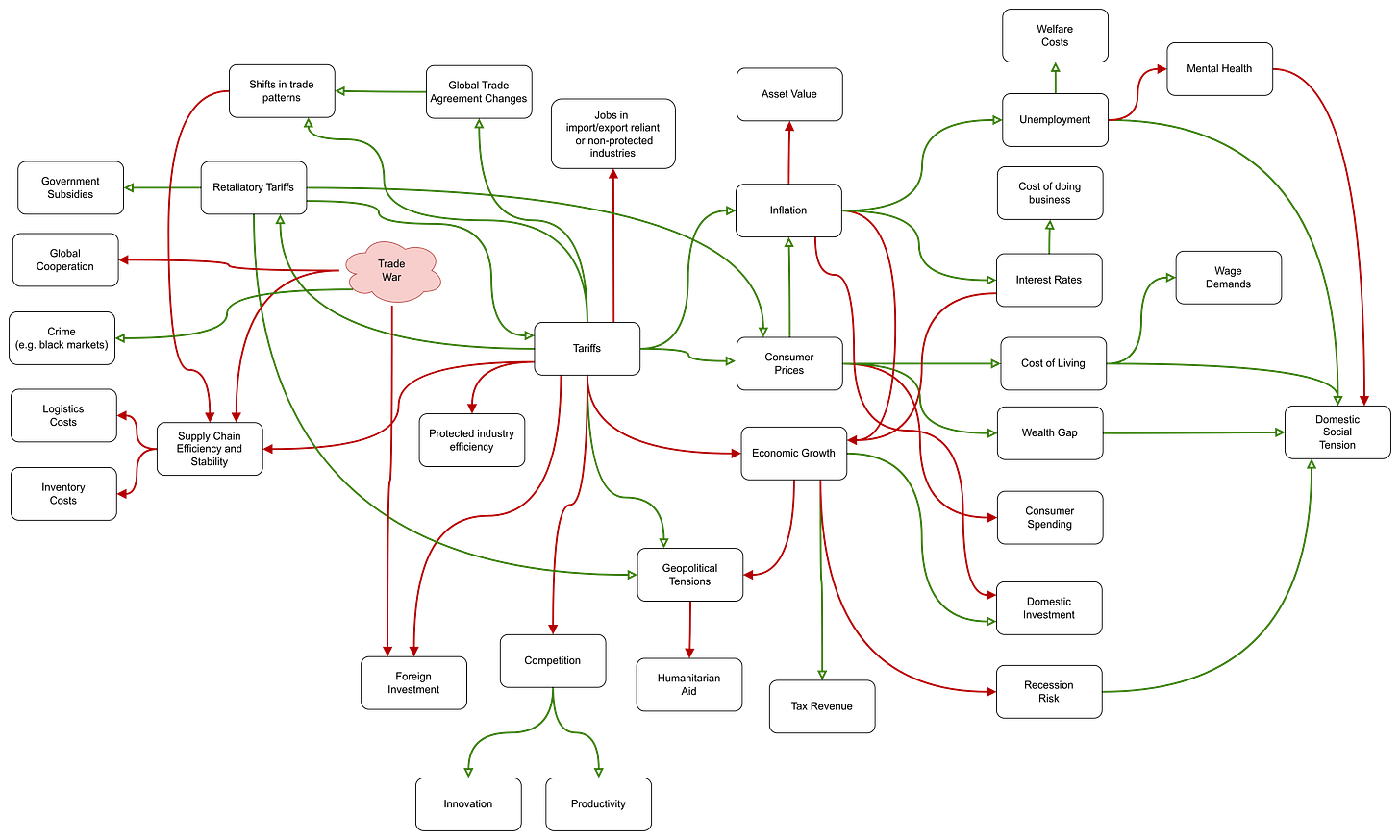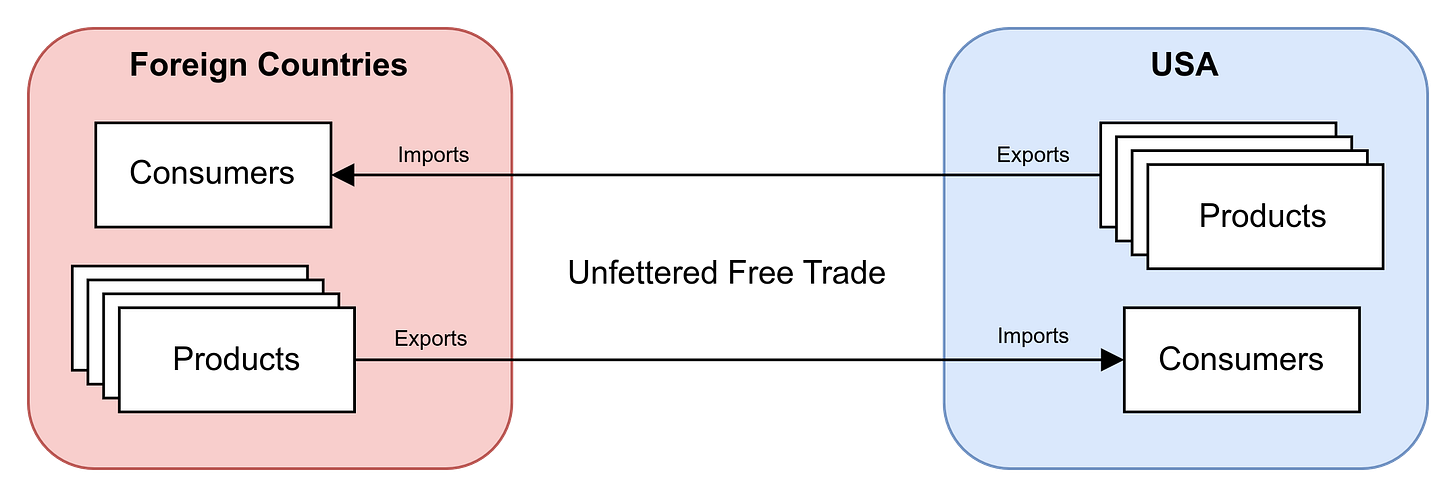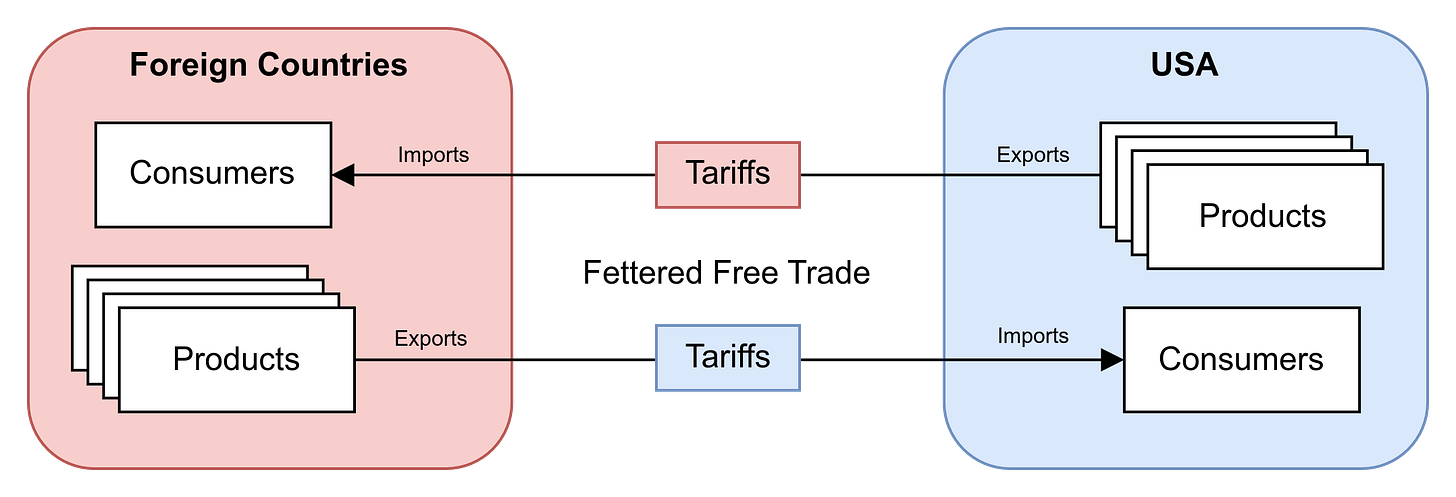Look, Ma! I'm a Global Economics Expert!
"Economics is extremely useful as a form of employment for economists." - John Kenneth Galbraith
Tariffs. Good or bad?
In working to craft this post, I started with a solidly good feeling from one of my financial superpowers: When it comes to understanding ginormous systems - like investing, economics, and raising children - whatever I believe about the depth of my understanding on the subject is wrong. So I began with the notion that "tariffs are just another economic tool and the effect of Trump's tariffs will ultimately be good." Of course, staying true to my superpower, this must be wrong. It's also obviously wrong for the simple reason that buried within my notion is the fact I don't know what a tariff is. At least that was the case as I began sketching out this post.
After a little not-too-complicated homework, I now have this picture of the difference between unfettered free trade:
…and free trade fettered by tariffs:
I now know tariffs are imposed by governments on imported goods. Why do they do this? Answering this is where things start to get complicated. Tariffs raise money for the government imposing the tariffs, at least initially. They might be used to protect a favored domestic industry, probably because some influential lobbyists have pressed for protection. Maybe there are long-term economic goals the imposing government has like correcting an unfair trade balance between the two countries. The picture becomes exponentially more complicated when attempting to answer the question "What are the knock-on consequences of imposing tariffs?"
Tariffs Are/Are Not a Tax
The back and forth about tariffs being taxes or not is robust. And confusing. To my long-time-working-stiff ears the arguments seem to be semantic. What's undeniable is that the costs of tariffs are passed along to the end consumer. This must be so for any business caught in a tariff war and desires to stay in business. Maybe there are a few large companies that have banked a lot of money by gouging consumers and exploiting labor, but I suspect most are running close to the bone. Personally, maybe I can dodge a few things that will increase in cost, at least initially, like housing since my house is paid off. But I'll still get hit by the basics like food and clothing. So a widespread tariff war cannot not result in the cost of living going up for me. The question of greatest interest to me is, "By how much?" So I'm not interested in getting wrapped around the axle by what term is used to characterize a tariff. All that matters to me is that it'll make living my life more expensive in the interests of some larger goal that probably carries with it a significant parasitic burden of corruption and greed.
International Investment and Trade Deficits
My understanding of trade deficits and surpluses:
The way this is supposed to balance out is:
According to economist Robert Graboyes:
"A trade deficit in goods and services is just the mirror image of inward flows of international investment. If America is a superior place to invest in land, business, education, etc., foreigners will buy more American stocks, bonds, land, and factories than Americans buy foreign stocks, bonds, land, and factories. That capital inflow will yield an equal increase in America’s overall trade deficit. This is arithmetic, not theory." (Emphasis added)1
Too many conditionals and modal operators of necessity hanging off of that statement to leave me with a comfy feeling. The arithmetic isn't guaranteed, which means there's more theory in this assertion than Graboyes lets on. True enough, in theory trade deficits are offset by foreign investments in the deficit country. But WHAT IF they aren't? WHAT IF America becomes a less desirable place to invest in land, business, education, etc.? (That last one is looking more and more sketchy by the day, particularly higher education among males. If our own citizens aren't interested in investing in a college degree...?) WHAT IF the foreign investors are unwilling to invest in America? Drilling down into these questions left me lost in a vortex of econo-speak - currency reserve depletion, exchange rate depreciation, higher debt, etc., and a few things I did understand like wage cuts, unemployment, recession, and political instability.
This hasn't been stated in anything I've read, but presumable the concern is if Trump's tariff war goes on for some extended time (however economist's measure time) it will begin to erode foreign investor confidence and move the country toward some version of the vortex I got lost in.
The Bigger Picture
The way this all starts to make sense is to look at the bigger picture. I'm doing this from two different angles. The first is from a causal loop perspective (Figure 5.) With the help of AI and and information lifted from various articles along with my own questions about the gaps, I built the following causal loop diagram to track my emerging understanding.

The second angle from which I'm viewing events (Figure 6) is to include more than just one foreign country's economic relationship with the USA. We have to bring into the view many, many more countries and their economic relationship not just with the USA, but with each other. The balance for global economic stability is the result of every country's participation in the global economic system.
That the POTUS could jerk the global economic chain and grab the attention of virtually every country on the globe with any kind of meaningful economic relationship with America is impressive. Can any other country do this to the same degree? Maybe China, I suppose.
The whole system makes more sense now and it's clear there's virtually nothing I can do that will have any sort of meaningful influence to keep the system in balance. Like a lot of things - most things - it's outside my sphere of control. So no, I'm NOT a global economics expert and won't be pretending to be one. But I'm now more attuned to any large-ish boulders that may come rolling down the mountain headed in my direction.
Footnotes
1 Graboyes, R. F. (2025, April 10). Tired of winning, apparently. https://graboyes.substack.com/p/tired-of-winning-apparently
"Look, Ma! I'm a Global Economics Expert!" last updated on 2025.05.01.
I hope you will return regularly to The Remnant's Way as I often update posts, particularly Ab Initio, and do not always publish to email posts that are meant to support or serve as reference to existing or future posts.
And please consider becoming a paid subscriber. Doing so supports my writing efforts and grants me the most precious of all resources - dedicated time for writing. And for that, I am deeply grateful.
Image credit: Grok 3









